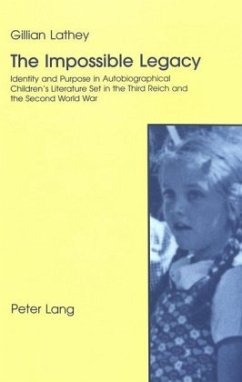This comparative study explores purpose and identity in the revision of wartime childhoods by German, Jewish and British writers addressing a child or adolescent audience. Autobiographical accounts published between 1970 and 1995 form part of a general reassessment of the past which was taking place at personal and national levels. For many authors the legacy of the war years presents narrative dilemmas. How, for example, does a German writer record the heady excitement of Hitler Youth rallies and marches in a manner which fulfils the didactic purpose expected of any book for children set in the Third Reich? Is the therapeutic purpose so evident in the work of exiled Jewish writers echoed in all accounts of childhood wartime evacuation, and is a sense of nostalgia exclusive to British texts? In passing their own stories on to the next generation, each writer's selection of content and control of narrative perspective reveal the roles of personal need and changing ideologies in recreating that "small person far away".

